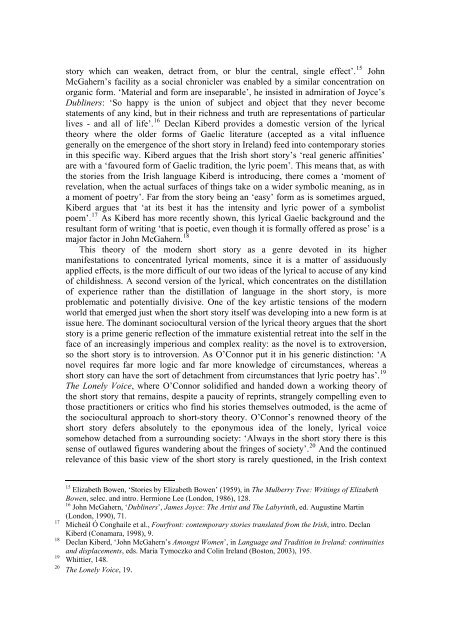Inside Out: A Working Theory of the Irish Short Story. John Kenny
Inside Out: A Working Theory of the Irish Short Story. John Kenny
Inside Out: A Working Theory of the Irish Short Story. John Kenny
Create successful ePaper yourself
Turn your PDF publications into a flip-book with our unique Google optimized e-Paper software.
story which can weaken, detract from, or blur <strong>the</strong> central, single effect’. 15 <strong>John</strong><br />
McGahern’s facility as a social chronicler was enabled by a similar concentration on<br />
organic form. ‘Material and form are inseparable’, he insisted in admiration <strong>of</strong> Joyce’s<br />
Dubliners: ‘So happy is <strong>the</strong> union <strong>of</strong> subject and object that <strong>the</strong>y never become<br />
statements <strong>of</strong> any kind, but in <strong>the</strong>ir richness and truth are representations <strong>of</strong> particular<br />
lives - and all <strong>of</strong> life’. 16 Declan Kiberd provides a domestic version <strong>of</strong> <strong>the</strong> lyrical<br />
<strong>the</strong>ory where <strong>the</strong> older forms <strong>of</strong> Gaelic literature (accepted as a vital influence<br />
generally on <strong>the</strong> emergence <strong>of</strong> <strong>the</strong> short story in Ireland) feed into contemporary stories<br />
in this specific way. Kiberd argues that <strong>the</strong> <strong>Irish</strong> short story’s ‘real generic affinities’<br />
are with a ‘favoured form <strong>of</strong> Gaelic tradition, <strong>the</strong> lyric poem’. This means that, as with<br />
<strong>the</strong> stories from <strong>the</strong> <strong>Irish</strong> language Kiberd is introducing, <strong>the</strong>re comes a ‘moment <strong>of</strong><br />
revelation, when <strong>the</strong> actual surfaces <strong>of</strong> things take on a wider symbolic meaning, as in<br />
a moment <strong>of</strong> poetry’. Far from <strong>the</strong> story being an ‘easy’ form as is sometimes argued,<br />
Kiberd argues that ‘at its best it has <strong>the</strong> intensity and lyric power <strong>of</strong> a symbolist<br />
poem’. 17 As Kiberd has more recently shown, this lyrical Gaelic background and <strong>the</strong><br />
resultant form <strong>of</strong> writing ‘that is poetic, even though it is formally <strong>of</strong>fered as prose’ is a<br />
major factor in <strong>John</strong> McGahern. 18<br />
This <strong>the</strong>ory <strong>of</strong> <strong>the</strong> modern short story as a genre devoted in its higher<br />
manifestations to concentrated lyrical moments, since it is a matter <strong>of</strong> assiduously<br />
applied effects, is <strong>the</strong> more difficult <strong>of</strong> our two ideas <strong>of</strong> <strong>the</strong> lyrical to accuse <strong>of</strong> any kind<br />
<strong>of</strong> childishness. A second version <strong>of</strong> <strong>the</strong> lyrical, which concentrates on <strong>the</strong> distillation<br />
<strong>of</strong> experience ra<strong>the</strong>r than <strong>the</strong> distillation <strong>of</strong> language in <strong>the</strong> short story, is more<br />
problematic and potentially divisive. One <strong>of</strong> <strong>the</strong> key artistic tensions <strong>of</strong> <strong>the</strong> modern<br />
world that emerged just when <strong>the</strong> short story itself was developing into a new form is at<br />
issue here. The dominant sociocultural version <strong>of</strong> <strong>the</strong> lyrical <strong>the</strong>ory argues that <strong>the</strong> short<br />
story is a prime generic reflection <strong>of</strong> <strong>the</strong> immature existential retreat into <strong>the</strong> self in <strong>the</strong><br />
face <strong>of</strong> an increasingly imperious and complex reality: as <strong>the</strong> novel is to extroversion,<br />
so <strong>the</strong> short story is to introversion. As O’Connor put it in his generic distinction: ‘A<br />
novel requires far more logic and far more knowledge <strong>of</strong> circumstances, whereas a<br />
short story can have <strong>the</strong> sort <strong>of</strong> detachment from circumstances that lyric poetry has’. 19<br />
The Lonely Voice, where O’Connor solidified and handed down a working <strong>the</strong>ory <strong>of</strong><br />
<strong>the</strong> short story that remains, despite a paucity <strong>of</strong> reprints, strangely compelling even to<br />
those practitioners or critics who find his stories <strong>the</strong>mselves outmoded, is <strong>the</strong> acme <strong>of</strong><br />
<strong>the</strong> sociocultural approach to short-story <strong>the</strong>ory. O’Connor’s renowned <strong>the</strong>ory <strong>of</strong> <strong>the</strong><br />
short story defers absolutely to <strong>the</strong> eponymous idea <strong>of</strong> <strong>the</strong> lonely, lyrical voice<br />
somehow detached from a surrounding society: ‘Always in <strong>the</strong> short story <strong>the</strong>re is this<br />
sense <strong>of</strong> outlawed figures wandering about <strong>the</strong> fringes <strong>of</strong> society’. 20 And <strong>the</strong> continued<br />
relevance <strong>of</strong> this basic view <strong>of</strong> <strong>the</strong> short story is rarely questioned, in <strong>the</strong> <strong>Irish</strong> context<br />
15 Elizabeth Bowen, ‘Stories by Elizabeth Bowen’ (1959), in The Mulberry Tree: Writings <strong>of</strong> Elizabeth<br />
Bowen, selec. and intro. Hermione Lee (London, 1986), 128.<br />
16 <strong>John</strong> McGahern, ‘Dubliners’, James Joyce: The Artist and The Labyrinth, ed. Augustine Martin<br />
(London, 1990), 71.<br />
17 Micheál Ó Conghaile et al., Fourfront: contemporary stories translated from <strong>the</strong> <strong>Irish</strong>, intro. Declan<br />
Kiberd (Conamara, 1998), 9.<br />
18 Declan Kiberd, ‘<strong>John</strong> McGahern’s Amongst Women’, in Language and Tradition in Ireland: continuities<br />
and displacements, eds. Maria Tymoczko and Colin Ireland (Boston, 2003), 195.<br />
19 Whittier, 148.<br />
20 The Lonely Voice, 19.

















